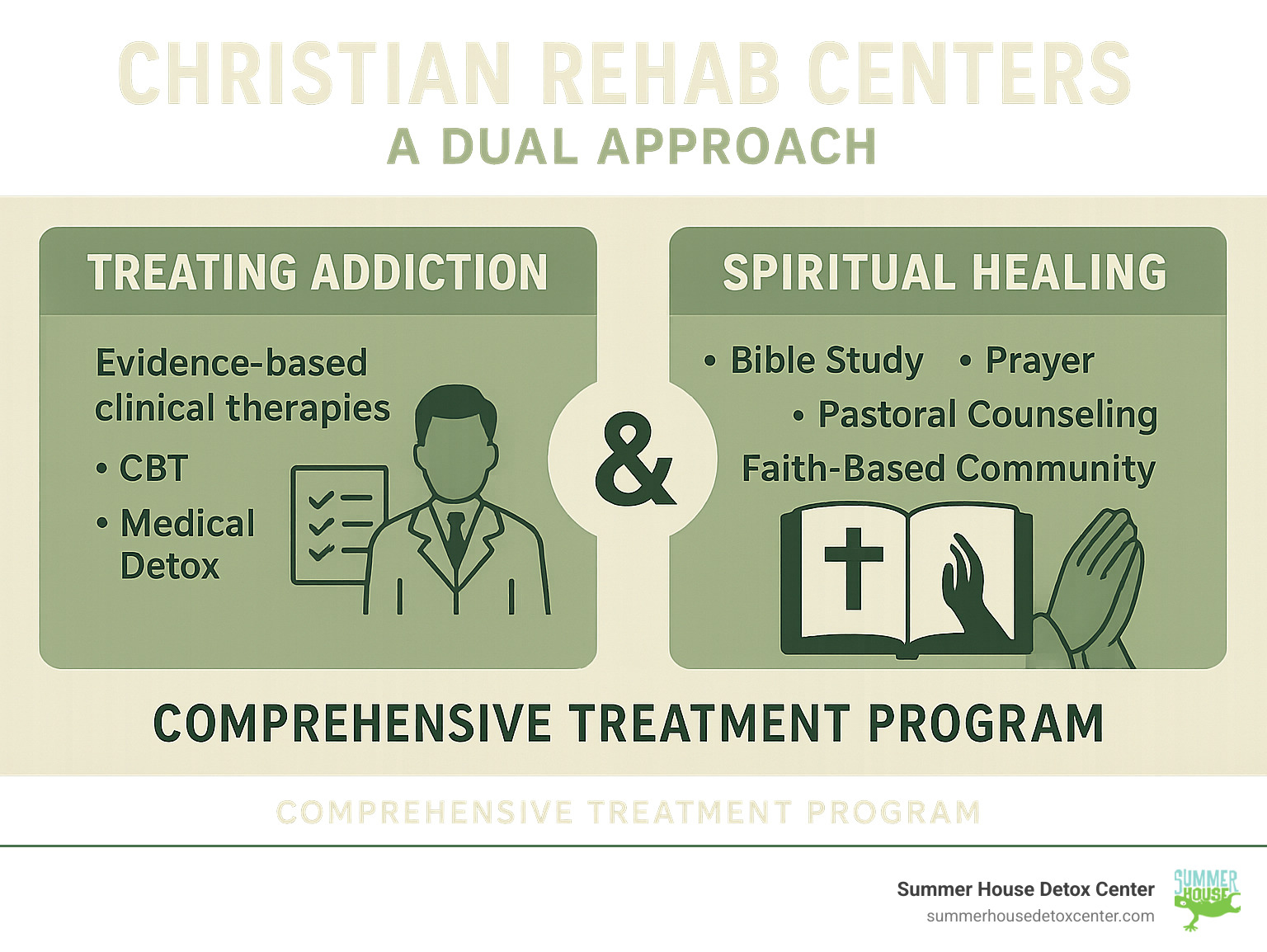Why Faith-Based Recovery Centers Are Changing Lives
Christian rehab centers combine professional addiction treatment with spiritual healing to help people overcome addiction. These programs integrate therapy with Biblical teachings, prayer, and pastoral counseling so recovery addresses both the physical and spiritual sides of healing.
Key features of Christian rehab centers:
- Clinical therapy combined with spiritual guidance
- Bible study and prayer as part of daily programming
- Pastoral counseling alongside licensed therapists
- Community fellowship with others who share similar beliefs
- Focus on forgiveness and redemption to reduce shame and guilt
- Long-term support through faith-based recovery communities
Many people in recovery describe a spiritual void that standard treatment may not address. As one study found, “a significant majority of participants credited spirituality for providing them with an unshakeable feeling of strength” during their recovery journey.
In Florida, including the Miami area, faith-oriented programs offer inpatient and outpatient options and welcome people from all backgrounds who are open to exploring spirituality as part of care.
This approach recognizes that addiction affects the whole person—mind, body, and spirit. When spiritual needs are supported alongside clinical treatment, people often find renewed strength, purpose, and hope for long-term sobriety.

Christian rehab centers word guide:
What is Christian Rehab and How Does It Work?
Christian rehab centers offer a comprehensive approach to addiction treatment that cares for the body, mind, and spirit. These specialized programs pair proven medical care and therapy with faith-based principles to support lasting change.
Many people in recovery feel a spiritual void that conventional programs don’t fully address. Faith-based treatment gives those who are open to it the chance to explore how spiritual practices can strengthen recovery.
At these centers, you’ll find traditional therapy such as individual and group sessions alongside prayer, Bible study, and pastoral counseling. The intention isn’t to force belief; it’s to provide space for spiritual growth that can reinforce clinical progress. A major emphasis is forgiveness—receiving it and learning self-forgiveness.
This approach recognizes that addiction is not a moral failing. It’s a complex condition best treated by addressing spiritual needs in tandem with clinical care. The role of therapy in detox remains essential and is often improved by a spiritual dimension.
Core Philosophies of Faith-Based Treatment
Faith-centered treatment is built on the idea that many people use substances to fill a spiritual void. For Christians, connection with a higher power—God—brings meaning, hope, and direction.
Research shows a relationship with a higher power contributes to life satisfaction. When grounded in something bigger than yourself, recovery becomes about redemption and purpose, not just abstinence.
The community fellowship aspect is equally important. Connecting with others as a part of the recovery process can be especially powerful when surrounded by people who share your values. Praying, studying scripture, and encouraging each other’s spiritual growth are core parts of the journey.
Faith-based treatment teaches that recovery is a whole-life change. It’s about finding identity in Christ, trusting God’s grace, and focusing on what truly matters. That shift opens the door to lasting strength and joy.
This journey helps answer a key question: what do we need to find our purpose? For many, spiritual connection provides the answer.
Combining Clinical Methods with Spiritual Guidance
These programs are effective because they combine science and faith, using evidence-based therapies together with spiritual guidance.
You’ll receive proven clinical treatments, including Cognitive Behavioral Therapy (CBT) to change unhelpful thought patterns. In a faith-based setting, this often becomes religiously-integrated CBT that adds prayer and spiritual practices as coping tools.
Many centers also provide dual diagnosis treatment, as addiction frequently co-occurs with conditions like depression, anxiety, or trauma. This holistic approach supports the whole person.
Care is personalized. In the first week, you’ll typically meet with a mental health counselor and a physician to build a custom plan that blends clinical expertise with pastoral counseling.
This integrated model recognizes addiction as the shapeshifting disease affecting every part of life. Addressing physical, emotional, mental, and spiritual needs together helps build lasting recovery. The importance of personalized care in detox is even more meaningful when it includes your spiritual goals.
The Benefits of Choosing a Faith-Centered Path
The recovery journey can feel overwhelming, but faith-based programs nurture physical healing and spiritual well-being.

A major benefit is renewed hope. When addiction has taken so much, faith offers the promise of redemption. Research supports this, noting that “a significant majority of participants credited spirituality for providing them with an unshakeable feeling of strength” during recovery.
This spiritual strength becomes a powerful safeguard against triggers. Many people find that a growing relationship with God provides comfort and steadiness when willpower alone is not enough.
Faith-based care also helps reduce guilt and shame. Teachings about God’s grace and forgiveness encourage you to see yourself as worthy of healing, so you can focus on making progress.
You’ll develop positive coping skills rooted in faith—turning to prayer, scripture, and community instead of substances. These skills support long-term sobriety.
By caring for mind, body, and spirit, faith-centered programs can help you reconnect with your true self, free from the weight of addiction. To learn more about reshaping thinking patterns, see Rewriting Your Internal Dialogue.
The Role of Community and Fellowship
Recovery isn’t a solo journey. Entering a faith-based program means joining a community of people who share your values and are walking a similar path.
A shared foundation of faith builds strong bonds. It’s easier to be vulnerable and honest when you’re with people who understand the power of prayer and scripture.
This community provides gentle accountability. Peers and mentors care about your growth, pray for you, and celebrate progress.
Many centers connect you with mentors in long-term recovery, whose stories show that lasting sobriety is possible.
These connections often continue after treatment, creating a lifelong support network that combats isolation. For more on building connections, visit Connecting With Others as a Part of the Recovery Process, The 6 Types of People You Need in Sobriety, and Why We Need Sponsors to Help Us Recover. This fellowship is a steady source of Hope.
Finding Strength and Purpose Beyond Addiction
Addiction often steals purpose. Faith-oriented care helps you see that your story isn’t over.
Spiritual growth becomes the foundation of recovery. Seeing yourself through God’s eyes—not through past mistakes—can redefine your identity.
Many people refind purpose through serving others—volunteering, mentoring, or caring for family—which strengthens recovery by shifting focus outward.
Cultivating gratitude changes perspective and brings daily joy. Research links connection to a higher power with greater life satisfaction, pointing toward a more fulfilling life.
As you grow in faith and recovery, the future becomes something to look forward to. For guidance on direction and mindset, see What Do We Need to Find Our Purpose?, The Importance of Gratitude, and Look to Your Future Self for Guidance.
Finding the Right Christian Rehab Centers in Florida
Finding the right faith-based program in Florida is a crucial first step toward recovery. In cities like Miami, Orlando, and Tampa, you’ll find options that integrate Christian values with professional care.

Your local church community is a great starting point. Pastors and congregants often know reputable programs in the Miami area that align with Christian values.
Online directories can help you filter by location and services, but always call and speak with intake specialists to understand the program’s approach.
Verify state licensing—Florida requires legitimate treatment facilities to be licensed—and look for accreditation such as The Joint Commission.
Check insurance coverage early. Many plans recognize the value of faith-integrated programming, potentially expanding your options.
If this search feels overwhelming, please Contact Us—we’re honored to help you find a path forward in Florida.
What to Look for in a Christian Rehab Center
Choose a program that honors your faith and delivers professional care.
Confirm accreditation and licensing. Look for true integration of clinical and spiritual care: licensed therapists who respectfully discuss faith alongside evidence-based therapies, and pastoral staff trained in ministry and addiction recovery.
Strong aftercare planning shows commitment to long-term success. Quality programs connect you with local churches, support groups, and spiritual mentorship for the months and years ahead.
Review the treatment philosophy. Does it emphasize God’s grace and forgiveness? Does it help you find purpose beyond addiction? The approach should resonate with you.
Check testimonials and reviews to see how others experienced the program.
To learn about building a solid foundation, visit Life After Detox: Building a Strong Foundation for Long-Term Sobriety.
Types of Programs Available in the Miami Area
South Florida offers a full spectrum of care to meet you where you are, from immersive residential treatment to flexible outpatient options.
Inpatient residential programs provide a structured, retreat-like setting with medical care. Lasting 30 to 90 days or more, they’re ideal for severe addiction or co-occurring disorders.
Outpatient programs include Partial Hospitalization Programs (PHP) for intensive daytime treatment while you live at home; Intensive Outpatient Programs (IOP) with several hours of therapy weekly; and standard outpatient care for ongoing support.
Sober living homes help bridge the move from treatment to independent living. Many Miami-area providers partner with faith-based sober living communities for ongoing support.
Gender-specific programs address unique challenges men and women face, including trauma, relationships, and spiritual growth.
| Feature | Inpatient Christian Rehab | Outpatient Christian Rehab |
|---|---|---|
| Environment | Live-in, highly structured, immersive, drug-free | Live at home, attend sessions during the day/evening |
| Intensity | High, round-the-clock care, intensive therapy | Moderate to low, varying levels of structure and session frequency |
| Support | Constant peer and staff support, removed from triggers | Access to therapy and community, but more external freedom |
| Suitability | Severe addiction, co-occurring disorders, need for full immersion | Less severe addiction, stable living environment, post-inpatient |
| Flexibility | Low (full-time commitment) | High (allows for work, school, family) |
| Spiritual Focus | Deep integration into daily life, constant spiritual mentorship | Integrated into sessions, but personal practice is more self-driven |
Most programs require medically supervised detox before therapy begins to ensure you’re stable and ready to engage.
We designed our Miami facility to provide comfort and hope. To see our environment, visit Our Facility.
Frequently Asked Questions about Christian Rehab
Considering a faith-based program can feel overwhelming. Here are answers to common questions we hear from families in Miami and across Florida.

Do I have to be a Christian to attend?
No. Most programs welcome anyone who is open to exploring spirituality as part of healing.
Participants range from those with strong faith to those who are simply curious about the spiritual dimension of recovery. The key is respecting the program’s Christian foundation. You won’t be forced to convert—you’ll be invited to experience practices that many find helpful.
The well-known 12-step programs grew from Christian principles and the idea of a “higher power,” and they have helped millions regardless of religious background.
How much do Christian rehab centers cost in Florida?
Costs vary by program length and intensity. Residential care typically costs more than outpatient options because of 24/7 support, housing, and meals.
Many organizations are nonprofit and may offer free or low-cost programs for those who qualify. These can have waiting lists but increase access to care.
Insurance coverage is also important. Many health plans cover treatment at faith-integrated facilities—verify your benefits with the center you’re considering.
Choose the right clinical and spiritual fit first; reputable programs often offer payment plans or financial assistance to help make treatment possible.
What is the first step before entering rehab?
Before entering a faith-based program, the crucial first step is medically supervised detoxification. Many centers require this to ensure your safety and readiness for therapy.
Detox ensures safety and creates a solid foundation for recovery. It’s hard to focus on therapy or spiritual growth during withdrawal. Stabilizing your body and mind comes first.
Withdrawal can be dangerous, ranging from severe discomfort to life-threatening complications. Medical supervision ensures you’re safe and as comfortable as possible.
At Summer House Detox Center in Miami, we’ve seen how personalized, medically supervised detox sets people up for success. Our experienced staff—many in recovery themselves—provide care with dignity and respect.
Detox begins with a comprehensive assessment to create a plan for your physical and mental health needs.
Most programs ask for detox before admission so you can participate fully from day one. To learn more, read The Importance of Medically Supervised Detox: Why DIY Detox Can Be Dangerous and Breaking the Cycle: How Medically Supervised Detox Sets the Foundation for Recovery.
Conclusion
Recovery becomes transformative when faith and evidence-based care work together. Christian rehab centers address the whole person—mind, body, and spirit—so forgiveness can replace shame, fellowship can ease isolation, and purpose can fill the emptiness addiction leaves behind.
In Florida, especially around Miami, you’ll find programs that use this holistic approach across inpatient and outpatient settings.
The essential first step is medically supervised detox so you’re stable and ready for deeper work. That’s where we can help.
At Summer House Detox Center in Miami, we start every journey with dignity and hope. Our personalized treatment plans for optimal recovery ensure you’re treated as an individual. Many on our team are in recovery themselves and understand what you’re facing.
This is your chance for a new beginning grounded in faith and science. The combination of clinical excellence and spiritual hope has changed countless lives—and it can change yours, too.
Ready to take the first step? We’re here to help you begin with the care and support you deserve. Learn more about our approach and Why Us? – your recovery story is waiting to be written.
